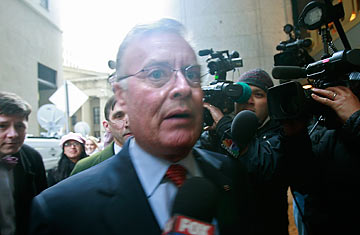
Ken Lewis prepares to enter the offices of New York attorney general Andrew Cuomo in New York City
(2 of 2)
Since the acquisition, Bank of America's stock has fallen 50% and at one point went as low as $2.53. The problems at Merrill Lynch have turned out to be much bigger than Lewis originally thought. And at times, the Merrill-related losses have raised anxiety about the health of the entire bank. In January the Treasury Department announced it was injecting an additional $20 billion into Bank of America. In all, the government has spent $45 billion trying to stabilize the finances of the bank.
Many analysts believe that the Merrill deal, while risking the solvency of Bank of America, will end up being a boon for the bank. Merrill still has a strong investment-banking franchise, and even in the depth of the financial crisis, its wealth-management business continued to be profitable. Nonetheless, Lewis won't be around to see the fruits of the deal.
Anger among Bank of America investors about the Merrill Lynch deal has been brewing for months. In April, shareholders voted to strip Lewis of the title of chairman. Even then, some people predicted Lewis was not long for the bank, but he managed to hold on to his CEO title for six more months.
Lewis' problems came to a head this summer. Bank of America had struck a deal with the SEC to pay $33 million to end an investigation into whether some unnamed Bank of America executives had mislead shareholders when it purchased Merrill. The SEC alleges that in early December, on the eve of a vote to approve the Merrill deal, Bank of America executives told shareholders that no bonuses would be paid to Merrill executives prior to the acquisition. In fact, Bank of America had agreed more than a month earlier to approve the payment of more than $5 billion in year-end bonuses to Merrill employees.
But in September, Judge Jed Rakoff said he would not accept a settlement that did not name specific executives. New York attorney general Cuomo is reportedly considering pursing his own charges against Lewis and other Bank of America executives on issues surrounding the Merrill acquisition. Pursuant to Rakoff's ruling, the SEC has gone ahead with its case against the bank in general but has yet to name individual executives in the suit. Cuomo recently subpoenaed a number of current and former Bank of America board members. He has not indicated whether he intends to bring charges.
In his letter on Wednesday to Bank of America employees, Lewis wrote, "Some will suggest that I am leaving under pressure or because of questions regarding the Merrill deal. I will simply say that this was my decision, and mine alone." It is also abrupt. Just months ago, Lewis told Congress he intended to stay on as head of Bank of America until all the assistance it had gotten from the government to survive the financial crisis had been repaid. It seems unlikely that Bank of America will be able to pay back the government $45 billion anytime soon.
In a statement, Bank of America said it plans to name a successor to Lewis before the end of the year. Observers say Brian Moynihan, who in August was promoted to the head of the bank's retail network, is the most likely to replace Lewis. Another possible though less likely contender is Sallie Krawcheck, who was formerly the head of Citigroup's brokerage division and joined Bank of America in August.
But whoever takes over from Lewis will have a tough job returning the bank to the position it was in on the eve of the credit crisis. Lewis seems to agree. In the resignation e-mail that went out to employees, Lewis wrote, "I am disappointed in how we managed credit risk. The next two quarters will be difficult."
